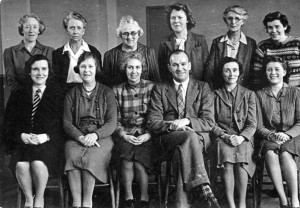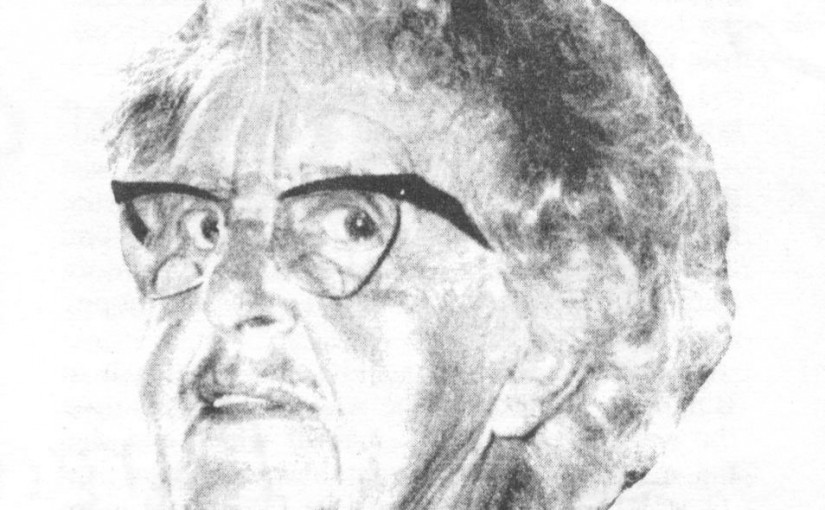“RYE’S 0WN” PAYS ITS OWN SMALL TRIBUTE TO A GREAT SERVANT OF RYE.
Lilian Smith – Teacher
BY A.G.PAGE
I have already written—well or badly I do not know—several such articles for this magazine. Sometimes I have been satisfied with the manufacture and sometimes not. Never have I felt, except perhaps in one case, that I did not do justice to the subject at hand. Even more, I have never felt that I had no chance of doing so before I ever started.
It may be that before I have never felt I knew (to the extent that it gave the word any sort of meaning) any of those personally. That gave me some licence. In the case of Lilian Smith it is quite different. She, back in the depths of time, taught me just as she taught three generations of other Ryers. And I, within a decade, have been one of the last. As with all selfish children of my age I rarely appreciated those specific little kindnesses one is paid over a longish period. Instead they blur into the past and become merely “happy years” or “good times”. I suppose I have forgotten all she has done for me (I feel sure that she will forgive me for saying so). But she, as much as anybody I can think of made my school-days less tortuous than they might have been. I shall be ever grateful to her, as so many people around here shall be, or are.
She is not a Ryer by birth but I think she may have become naturalized to our peculiar breed. In fact she was born at her father’s house at Upper Broughton, Nottinghamshire in the Black Country in 1886. Nottinghamshire was then the hub of industrial Britain, and industrial Britain the hub of our commercial Empire. Her father was a very wealthy local man, not in the manufacturing world but one of those rural entrepreneurs that dealt with almost everything. Most of all, he was a coal merchant about the district in a big way Evidently he didn’t like too much competition.
At the age of five she went to the Upper Broughton School and from there to the Mundella College. Her father was on the school board. It was for that reason only that she agreed to enrol as a student teacher at the same institution. She admits that she didn’t really want to but felt a certain filial responsibility. There was in any case no real alternative to obeying parental wishes. She remained in Nottingham for four years. She managed a full class all day and did theoretical studies in the evening. In 1904 she took and passed the Scholarship, as entrance to the profession was then called.
The Brooks’ house was large—it needed to be for a family of such Victorian proportions. She was the third of five sisters and four brothers. There were servants and an interminable stream of calling-in relations. The garden was typically self-sufficient for the turn of the century. And there was an enormous orchard “It was full of the most delightful things, all the fruit that you could possibly think of. There were apples, of course, and pears, and quinces and plums, cherries, greengages, nuts and damsons. We made lots of jam and preserves. We had to, otherwise we could never have got through it all. And in the conservatory there were figs and apricots, grapes and peaches”. At the back on the rough they kept a cow which almost everybody could milk, while the pigs supplied the bacon and pork. The pride of the business were the massive shire horses that drew the fuel wagons. They were champions and often shown. Her elder brother—“I don’t suppose he liked work very much” —used to hunt with the Quorn on one of the shires, then as now the greatest meet in England. Coal was 10/- a ton for the very best quality and the squirearchy seldom ordered less than twenty at a time. Everybody needed the stuff, a great producer nation could not survive without it and there was no substitute. To be in the coal business in 1905 was to be very important indeed. Mr. Brooks even owned a couple of private railway stations. The Sunday joint weighed fourteen pounds and little was left at the end of the meal.
Her parents were keen on whist and spared the feelings of their children nought if they let them down as a partner. Everyone went to see the horses race at the point-to-points and console father when he fell off—which he inevitably did, On Sundays the house was full of neighbours and friends for the après-church socializing. Hymns were sung with gusto but it was more than a purely religious affair. It was the big day of the week and, paradoxically, the one on which the children could get away with more than at any other time. It was thus the happy day.
In 1906 she left her old school to teach at Bingham. Her room (she was now away during the week) cost just 5/-, a tariff which included the meat but not the vegetables, bread or fish. The cost of living seemed low. One could more than exist for £2 a month and perhaps save a little. The salary—Mrs. Smith remembers she thought it very reasonable at the time—was £45 per annum. It went even further than normal because she had spent a short time at a Dairying college and learned all the money-saving crafts of Edwardian domestic life. “People think I can’t do anything but I’m very handy really—I can dress poultry or game, keep bees, and make cheese—I was taught to make Stilton you know, and I can cook very well”.
In 1910 she left her beloved Black Country and travelled south to a county she knew little about, farther abroad than she had ever been. The then Miss Brooks began to teach at Peasmarsh. She was very happy. In 1915 she moved to Staplecross, and it was there, some years later, that she was married. Morton, her first child, was born just twenty-four months later, and was followed by a daughter, Marjorie, and then a second daughter, July They were peaceful times, full of somnolent pleasures.
She had always been a keen bicyclist and now everybody took to the road. To Maidstone and back was not unusual on a warm summer’s evening. In the cold months the local choirs win organised with tremendous enthusiasm. She has always loved singing and a genuine dedication to music has managed to extract the very most from her sometimes cagey charges. They could walk along the wide stretch of blue gold sand at Camber and meet only the lone fisherman tending his ground-net.
“Even at the height of the season you could change in almost absolute privacy, there were no beach huts or anything. The only buildings away from the small road to Folkstone and Lydd were the sheep-farms. It was just so different then you couldn’t explain”.
In 1928 Mrs. Smith returned to school. For the next four decades she was to give the most gracious and unstinting service to this town.
She worked in the Lion Street School and the Mermaid School (between the Wars) and latterly in the junior section of the new school in Ferry Road. It has been her life entirely and the greater the individual challenge the greater has been her will to overcome it and succeed.
She travelled with her class to Bedfordshire when the evacuation came in 1940. There, under her tuition, the first ever passes were achieved into the grammar. Her real sympathy lay, however, with the remedial forms. And nothing gave her more happiness than the appreciation of her own pupils. She tells with noticeable pride the story of the small backward who at that time wrote to her saying:
Before I came to your class Miss I didn’t no nothing, and now I no a lot”.
Before she left and when she came back to Rye she assisted long and additional hours with the W.V.S. Her home in South Undercliff was a haven for the desolated, and nobody was refused a bed. Mr. Smith was a maniac humanitarian, even to distressed Polish soldiers. Incendiary bombs dropped in Morton’s bedroom and H.E.’s in the river but that did nothing to deter the local aid-all society.

After the War there was, as with many people, a strange silence. The excitement must have left a big hole in the Smith family life. To a certain extent this was compensated by the brand new school to go to and the new responsibilities that followed certification in 1945. The children gradually dispersed their various ways—the girls into marriage and the son into teaching.
The demands remained great even to the end. She was as indispensable in 1965 as she had been twenty years previous,and the kids were the same except that there were more of them, In 1957 she travelled to see Morton in Cyprus where he was on tour at a British army school. It was during the Emergency and guns were taken into the staff canteen. It was all very exciting indeed, and the only part about her visit she didn’t like were the un-nerving rounds of indigestible cocktail parties.
She has now retired of course. Yet she is as I remember she taught me. Fifty-eight years of teaching are behind her; from the mid.teens to the great and venerable age of eighty. The face is still as dear and resilient, the eyes so sharp, the hand she writes so crisp and clean and honest. When she talks she smiles countlessly but remains almost serious.
She tends her house with a profound attachment. It is (one would expect nothing else) absolutely scrupulous. It is like her; it has charm and taste and dignity. Mrs. Smith is, could only be, the classical grandmother. And she is adored in turn by them.
Things are quieter these days. She still bikes everywhere but it is naturally very tiring. Incredibly she still swims and is pleased to note that there have been three dips this year already. Then the garden has to be attended—her pride and joy are the roses. Her favourite is the Peace.
How do you judge a great educationalist? How do you become a hero of our time? The present government issued a directive to the Home Office recently as a memo to those responsible for data selection to the Honours List. Paraphrased it read: “Mere service to the nation over a long period is deemed insufficient evidence for any person to be recognised”. Rye I trust will give a better deal. After all. Miss Lilian Brooks was told in 1906 that due to the strain of her work she must never teach again.
“Rye’s Own” August 1968
All articles, photographs and drawings on this web site are World Copyright Protected. No reproduction for publication without prior arrangement.
© World Copyright 2015 Cinque Ports Magazines Rye Ltd., Guinea Hall Lodge Sellindge TN25 6EG
